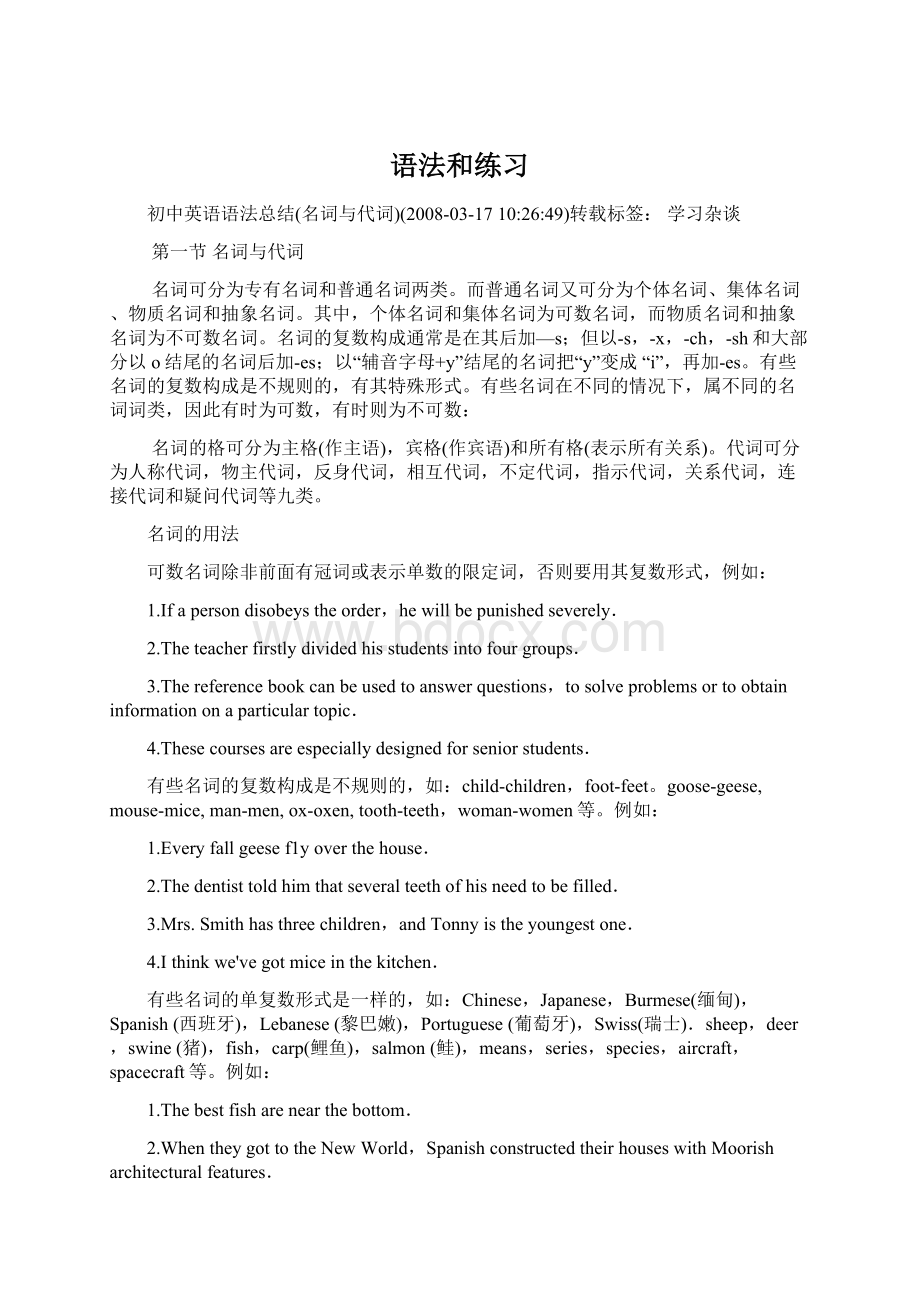语法和练习Word下载.docx
《语法和练习Word下载.docx》由会员分享,可在线阅读,更多相关《语法和练习Word下载.docx(44页珍藏版)》请在冰豆网上搜索。

有些名词的复数构成是不规则的,如:
child-children,foot-feet。
goose-geese,mouse-mice,man-men,ox-oxen,tooth-teeth,woman-women等。
例如:
1.Everyfallgeesef1yoverthehouse.
2.Thedentisttoldhimthatseveralteethofhisneedtobefilled.
3.Mrs.Smithhasthreechildren,andTonnyistheyoungestone.
4.Ithinkwe'
vegotmiceinthekitchen.
有些名词的单复数形式是一样的,如:
Chinese,Japanese,Burmese(缅甸),Spanish(西班牙),Lebanese(黎巴嫩),Portuguese(葡萄牙),Swiss(瑞士).sheep,deer,swine(猪),fish,carp(鲤鱼),salmon(鲑),means,series,species,aircraft,spacecraft等。
1.Thebestfisharenearthebottom.
2.WhentheygottotheNewWorld,SpanishconstructedtheirhouseswithMoorisharchitecturalfeatures.
3.Isawawhitesheeprunningdowntheroad.
4.Judgingbyhislanguage,hemustbeaJapanese.
在表示一类事物时,介词of后的名词要用复数形式。
1.Beethovenisofthegreatestmusiciansintheworld.
2.TheAnimalArtFestivalisbeingheldatShanghaizoo,whichisoneofthemostwelcomefestivalsinthecity.
3.Asoneofthecountriesthatbearresponsibilityfortheincident,GermanChancellorSchroederholdsthattheorganizationshouldapologizetoChinesegovernmentunconditionally.
4.SheisoneofthethreemartyrswhowerekilledinNATO'
sbombingontheChineseEmbassyinYugoslavia.
大多数集体名词可作单数,也可作复数,如:
army,audience,class,committee,crew(全体船员,乘务员),crowd,faculty,family,governmentgrouporchestra,public,team,union等。
但有些虽然是单数形式,却用作复数,如:
cattle(牡畜)mankind(人类),militia(民兵),people,police,poultry(家畜),staff(全体职员)等。
1.ThepresidentsaidtheChineseGowrnmentispayingcloseattentiontodevelopmentsinthismatter,andcontinuestoreservetherighttotakefutureaction.
2.Thecattle,weregrazingonthemeadownearthefarm.
3.Theaudiencewereamusedbyhishumorousstories.
4.Myfamilyisfarawayfromtheschool.
有些名词只有复数形式,而且也只用作复数,如:
clothes,glasses,spectacles,pants,arms(武器),belongings(所有物),customs(海关),goods(货物),suburbs(郊区),papers(文件)等;
而有些名词形式为复数,却用作单数,如:
electronics(电子学),mathematics(数学),optics(光学),politics,statistics(统计学)等。
1.Theshortshewearsaremadeofleather.
2.Linguisticsisadifficultsubjecttostudy.
3.Heusedtostudyelectronicswhichisn’thisfavoritesuject.
4.Ilovetoliveinthesuburbsthatareconclusive.
有些名词一般情况下以单数形式出现,表示总体。
但如果表示若干、多次或几种时,则要用其复数。
这类词有:
hair,fruit,pollution,rain,difficulty,success,wind,failure,favour等。
1.ThebarberhadbeencuttinghumanhairfortwoyearsbeforehecametoLosAngeles.
2.Motherboughtoranges,bananasandotherfruits.
3.Thesecavescollapseeasilyinheavyrains,andgreatwinds.
4.He’shavingfinancialdifficulties.
有些名词一般只有单数形式,它们通常是表示物质和抽象概念的不可数名词,像:
advice,baggage,bread,corn,clothing,equipment,education,fun,furniture,food,fruit,garbage,grass,happiness,homework,housework,humanity,information,knowledge,landscape,1aughter,machinery,mankind,merchandise,money,music,nonsense,nature,
population,progress,scenery,smoke,sweat,strength,traffic,thunder,ink,jewellery,damage,mail,work,soap,sugar,gold,chalk,cloth,anger,applause,cake,chocolate,poverty等。
1.Imustseektheadviceofaspecialistinthematterofthetransferofpropertyrights.
2.Headacheisthemostcommondiseaseofhuman.
3.Ireallygetalotoffunfromreadinginleisuretime.
4.ThepopulationofShanghaiisverybig.
有些名词单复数的含义不同,使用时要根据上下文的意思进行选择。
这类词包括:
communication(通讯)—communications(通讯系统,通讯工具),cloth(布)--clothes(衣服),content(内容)--contents(目录),convenience(便利)--conveniences(便利设备),humanity(人类)--humanities(人文科学),necessity(需要)-necessities(必需品),wood(木材)-woods(树林),pain(疼痛)—pains(辛劳),ruin(毁灭)-ruins(废墟,遗迹),sand(沙子)--sands(沙滩),work(工作)--works(工厂,著作)等。
1.“Hometown”isoneofLuXun’smostfamousworks.
2.Theinsurancecompanypaid$98,700indamagesfortheaccident.
3.Mychildenjoysplayingonthesands.
4.Nopains,nogains.
有些名词只有复数形式。
如:
fundamentals(基本原则),goods(货物),means(方法),shorts(短裤),sweets(欢乐),valuables(贵重物品)等。
1.Thefundamentalsaremadetoguaranteethesocialstability
2.Don’ttakeanyvaluablesthereforthesakeofsafety.
3.Thegoodswerepurchasedfromhimaren’texpensive.
4.Ithinkourproblemcanbesolvedbymeansofnegotiation.
名词做定语时,不能用作复数。
1.Pleasecheckyourexaminationpapercarefullyafterfinishing。
2.TheChina'
sCentralTelevisionStationsuppliesweatherreporteveryday,
3.You'
dbetterinformmyfamilymembersbeforeleavingforBeijing.
4.TheUnitedStatesandGermanyaretwomemberstatesofNATO.
复合名词的复数只把其中所包含的主体名词变成复数。
looker(s)--on,runner(s)-up,son(s)-in-law,editor(s)-in-chief,passer(s)-by,grand-child(ren),armyman(armymen),room-number(s),shoelace(s),dinnerplate(s),bloodtype(s)等。
如果没有主体名词,就在最后一个词上加复数词尾。
go-between(s),drawback(s)等。
注意以man,woman构成的复合名词,全部变成复数。
man-servant—men-servants,woman-soldier—women-soldiers。
1.Wouldyoubringmesomedinnerplates?
2.Wehadawonderfultalkwithsomewomen-soldiers.
3.Don’tregardyourselvesaspassers-byundersuchcircumstances.
4.Weareofdifferentbloodtypes.
名词的所有格一般在词尾加’s,已有复数词尾-s的,只加’。
1.Wemustworkhardtofulfilthecountry’splans.
2.Theschooliswithinastone’sthrow.
3.Nearbyareherrelatives’houses.
4.CouldyoutellmetheSmiths’saddres?
名词所有格有时还可以和of构成短语,有以下两种情况:
1)它所修饰的词前面有一个表示数量的词,如:
a,two,several,some,any,no,few等。
2)它所修饰的词前面有+个指示代词,使句子表示某种情绪。
1.SeveralstudentsofLaoYang’sactedintheplay.
2.WesawaplayGuoMoro'
s.
3.Atbirth,theheadofababyisextremelylargeinrelationtotherestofthebody。
4.IhavesomerecordsofNaYing'
2.代词的用法
1)人称代词有主格人称代词,在句中充当主语:
I,you,he,she,it,we,you,they和宾格人称代词,在句中充当宾语:
me,you,him,her,it,us,you;
them。
1.Wehaven'
tseeneachotherforalongtimesincehewentabroad.
2.Letyouandmehaveanappointmentforthenextweekend.
3.Haveyougotanyideaaboutthisissue?
4.Telluswhateveryou'
veheard.
2)物主代词可在句中作定语,有指人的:
my,our,your,his,her和their;
有指物的:
it,his或her(指国家或轮船)。
名词性物主代词作表语、主语、宾语,与of连用可作定语:
yours,ours,theirs,mine,her,his,its。
1.Tonnyisanoldfriendofmine.
2.Mydormitoryisnexttoyours,andMary'
sisonthethirdfloor.
3.Titanicsankwithherseveralthousandpassengers.
4.Nexttimeit'
sonmytreat.
3)反身代词亦称自身代词,可作宾语、表语,作主语或宾语的同位语,还与某些动词连用,与介词连用构成成语。
有:
myself,yourself,himself,herself,itself,ourselves,yourselves,themselves。
1.Thesechildrenaretooyoungtotakecareofthemselves.
2.Don'
tworry,hewillbehimselfagainsoon.
3.AlthoughUncleGeorgeisabad-temperedman,Ithinkheisakindmaninhimself.
4.Youshouldberesponsibleforyourself.
4)相互代词表示相互关系,有:
eachother(两者之间)和oneanother(多者之间)。
1.ImetMissScottthismorning,andwegreetedeachother.
2.Weshouldlearnfromoneanotherandmakeprogresstogether,
5)指示代词在句中充当主语、宾语和定语,有:
this,that,these,those。
Such也是指示代词,可作定语、主语和表语,修饰可数名词时要与a连用。
1.NowadaysTVprogramsaremuchmorecolorfulthanthoseOfthepast.
2.Themoneyspentonentertainment,accordingtosomeauthorities,hasexceededthatspentonpublichealth.
3.Iwanttoknowthis:
areyoutalkingabouttheaccidentIencounteredyesterday?
4.Hisfutureiscloselyboundwiththatofthecompany。
5.Youshouldn'
ttrustonsuchapersonwhoneverkeepshispromise.
6)疑问代词有who,whom,whose,whatwhich。
who可作主语和表语;
whom作宾语,whose,what,which可作主语、表语、宾语和定语,其中作主语时,要看所代表的人或物是单数还是复数,如果不清楚,则动词一般用单数。
1.Whowillseetothismatter?
2.Whomhaveyouchosentoberesponsibleforthework?
3.Itishardtodecidewhoseisbetter.
4.What’sonyourschedule?
5.Whichuniversitydidheenteratlast?
7)关系代词有who,whom,whose,that,which。
which代表事物,that代表人或物;
在非限制性定语从句中,不能用that,而用who(m)代表人,用which代表物,或代表主句所说的全部内容。
在带有a11,something,nothing,anything,much等的句子中不能用which,而用that。
1.Ourfootballteamwasdefeatedagain,whichshowsourplayersneedmuchmoreeffort.
2.Thefactorynowhasover1,000workers,halfofwhomarewomen.
3.Hepromisedtotellusallthatheknew.
4.Whoseturntomakepresentationisbcyondme.
8)连接代词有:
what,who,whonl,whose,which,用来连接主语从句、宾语从句和表浯从句。
Whoever,whomever,whichever,whatever为复合代词。
1.Ididn'
tknowwhattodoatthatverymoment.
2.ThegovernmentsellpublichousestowhoeverprovidesenoughamountOfmoney.
3.WhomeverIworryaboutisnoneofyourbusiness.
4.Takewhicheveryoulike,please.
初中英语语法总结(三)——代词
--------------------------------------------------------------------------------
发表日期:
2009年7月8日【编辑录入:
郭华】
【代词】
人称代词,物主代词,反身代词
类别
主格宾格形容词性物主代词名词性物主代词反身代词第一人称单数Imemyminemyself复数weusouroursourselves第二人称单数youyouyouryoursyourself复数youyouyouryoursyourselves
第三人称单数hehimhishishimselfsheherherhersherselfitititsitsitself复数theythemtheirtheirsthemselves
1.人称代词
人称代词it的特殊用法:
一般it指“它”,但在表示天气、时间、距离等时,用it来代替,此时的it并不译为“它”。
当三个人称代词(单数)同时出现时,其先后顺序为you,he,I。
而复数一般采用we,you,they顺序。
2.物主代词
物主代词的用法:
形容词性物主代词后面一定要跟上一个名词。
名词性物主代词可作主语、表语、宾语。
3.反身代词
1)反身代词的构成分两种:
第一、二人称反身代词在形容词:
性物主代词后加上self或selves,第三人称的反身代词在宾格代词后加上self或selves.
2)反身代词的用法:
一种是作宾语,由主语发出的动作又回到动作者本身。
Ienjoyedmyselfattheparty.另一种是作名词或代词的同位语;
用来加强语气。
Icandoitmyself.
3)初中阶段由反身代词构成的常用词组有:
enjoyoneself,helponeselfto,learnbyoneself,teachoneself,(all)byoneself,leave...byoneself,loseoneselfin等,在运用反身代词时,应注意它在数、性别上与哪一个保持一致。
试比较:
“Helpyourselvestosomefish,TomandMike.”与Ican’tleavethegirlbyherself.
指示代词
指示代词的特殊用法:
(1)为了避免重复,